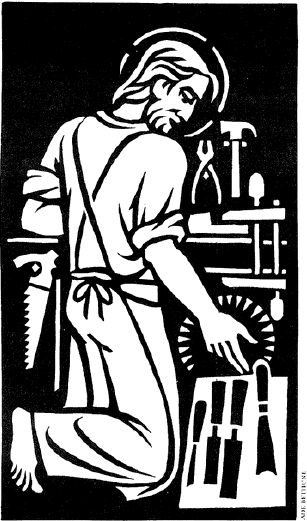It is a sobering thought, but most of our waking hours on this Earth will be spent in some form of work. Whether it be paid or unpaid, recognised or unacknowledged, outside of the home or inside the home, the way we approach work is a large part of the way we approach life. And if we remember that, according to the Bible, God is profoundly interested in our whole life and how we live it, not just some quarantined-off spiritual bit, then all this places the issue of work very high on the agenda of Christian discipleship.
William Temple, Archbishop of Canterbury during the Second World War, once wrote that:
Some young [and we could add, older] people have the opportunity to choose the kind of work by which they will earn their living. To make that choice on selfish grounds is probably the greatest single sin that any young [or older] person can commit, for it is the deliberate withdrawal from allegiance to God of the greatest part of time and strength.
That is a serious claim about the importance of how we think about work; nevertheless, it is probably uncommon for Christians to treat the decisions they make about work as a central component of how they try to follow Jesus in the world.
On the whole, I think it is fair to say that our attitudes to work are primarily absorbed, like so many other things, by a process of subconscious osmosis from the broader culture, and that is a culture where work has become deeply unhealthy. On one hand, the approach of many to work is driven by ambition, the need to succeed or the quest for higher incomes, and is too often manifest in overwork, for which families and marriages pay a price. On the other hand, an unsettlingly large number of households have no member involved in any purposeful work, an absence which also has dire consequences on the health of families. In the middle are a large number of people for whom work is a source of stress and distress. How can we step back and gain some perspective on this troubling picture?
 |
|
Scene from the mortuary chapel of ancient Egyptian vizier Rekhmire depicting slaves makings bricks, c. 1400 BC.
|
Work in the Bible
The Bible has much to say about the place of work in our lives (for the moment I am not making any distinction between formal and informal, or paid and unpaid work). Most strikingly, in Genesis 2:15 we are told that participating in work is fundamental to our created identity and purpose: ‘The Lord God took the human and put him in the Garden of Eden to work it and take care of it.’ Without some purposeful work to undertake, we are not fully ourselves. This is not just a theological proposition; where I live, in Long Gully, Bendigo, it is an observable fact: high rates of households with no working member correlates with high levels of family dysfunction. As the Apostle Paul says, ‘For we are what he has made us, created in Christ Jesus for good works, which God prepared beforehand to be our way of life’ (Eph 2:1). (Yes, Paul really said that!)
The Bible is eminently practical in recognising that we must work to sustain ourselves and our families and affirms that there is both dignity and meaning in labouring to live. Paul says that ‘Anyone unwilling to work should not eat.’ (2 Thess 3:10). However, there is also recognition of the profound satisfaction that we derive from ‘good work’‒ that is, work that is intelligently, skilfully and creatively undertaken in the pursuit of a good purpose.
In Exodus chapter 35, a passage generally too obscure and boring for modern readers, there is a fascinating picture of what good work looks like in the instructions given for the construction of the tabernacle and its paraphernalia. Critically, for a people who have just been liberated from slavery in Egypt, the passage begins with yet another reminder to keep the Sabbath – good work can only be good when it has boundaries and limitations placed upon it, and balanced with time for rest and relationships. Those who are to undertake this good work are those with a ‘willing spirit’, those whose ‘heart was stirred’, and those who are ‘wise-hearted’ (most translations these days say ‘skilful’, however the old King James rendering is probably closer to the sense of the meaning). How interesting that the critical job criteria are wisdom and orientation of heart – not criteria that are high in today’s job application processes.
In the biblical vision, good work has a central place in the good life. However, as in all things, the Bible also lifts the veil on the dark side of work. For the fallen Adam and Eve cast out of Eden, and then for Cain after them, the vision of good work had become a curse of futile toil. Their distance from God is immediately evidenced in their experience of work as hard labour (Gen 3:17-19). In Exodus, the archetypal story of liberation for God’s people is a story of liberation from (amongst other things) bad work – bad because it was work under compulsion and under bad conditions, and bad because it was work serving a bad purpose, which was the building of Pharaoh’s empire.
The Bible also asks critical questions about our attitudes to work, the sort of work we undertake and the underlying motivations of our work. Perhaps most importantly, the Bible is consistently scathing about devoting our working lives to the pursuit of a hollow dream of wealth, comfort and success: ‘You fool!’, Jesus says when he tells the story of a man who wasted his life in the pursuit of wealth and comfort (Luke 12:20). The biblical challenge is to think critically about how we invest our limited time and energy on this Earth:
Why spend your money on what is not bread,
and your labour on what does not satisfy? (Isa 55:2)
This prompts us to think about what things are actually worth our labour.
But there is also a danger that, whatever the purpose of the work, the work itself becomes its own end – the thing that is valued above all else, the thing that supplies all meaning and sense of purpose. In biblical language, this is called idolatry, and it is a consistent refrain of the prophets that humanity is consistently drawn to worshipping the work of its own hands (eg. Isa 2:8).
Moreover, not only is the Bible interested in the underlying motivations and purpose of our work, it is fundamentally concerned about the ethics of the work we do. There is no room in the Bible for any justification of work that involves harm to other people and to the community as a whole. Much of the work of the prophets is given to exposing and denouncing the systematic injustices of the ‘respectable’ world of commerce and business. In the eyes of the prophets, just because something is legal or even standard practice, does not make it acceptable and does not change the fact that people are suffering because of it:
The Lord enters into judgment with the elders and princes of his people: It is you who have devoured the vineyard; the spoil of the poor is in your houses. What do you mean by crushing my people, by grinding the face of the poor? (Isa 3:14-15)
Of course, the most profound ideas about work in the Bible are found in the New Testament. The New Testament writers are distinctly uninterested in how ‘important’ our work is or what our place in society is. Whoever we are and whatever our skills or position or lot in life, there is one big idea about work that applies to us all – we are called to participate in the work of God. This core idea is articulated in many different ways, again and again. Most profoundly, the resurrected Jesus says to the disciples in John 20: ‘As the Father sent me, so I send you’ (v.21). And what is Jesus’ work that has now been entrusted to us? Paul puts it most succinctly in 2 Corinthians:
All this is from God, who reconciled us to himself through Christ and gave us the ministry of reconciliation: that God was reconciling the world to himself in Christ, not counting people’s sins against them. And he has committed to us the message of reconciliation. We are therefore Christ’s ambassadors, as though God were making his appeal through us. (2 Cor 5:18-20)
The job with which we have been entrusted is nothing less than participating in the healing of the brokenness of the world. This means working to restore the broken relationship between humanity and God, the broken relationships between people, and the broken relationships between people and creation. This is such a big job that we all have a part and we are all needed – there is no such thing as unemployment in the Kingdom of God!
Paul expects that members of the Christian community will be involved in widely varying work. However, he urges all of them to think about how their work, whatever it is, can play some part in God’s work. Although there are many jobs to be done, and many different things needed, the most important thing is to think about our work in terms of the contribution it makes to the community (1 Cor 12:7). Paul talks of ‘co-workers in Christ’ (Rom 16:9), being involved in ‘good works’ (Eph 2:10), ‘works or service’ (Eph 4:12), and work that ‘builds up’ rather than pulls down (1 Cor 10:23-24). ‘So then, whenever we have an opportunity, let us work for the good of all, and especially for those of the family of faith.’ (Gal 6:10)
 |
|
By Shelley Knoll-Miller, see Manna Gum Gallery for more. |
Living out good work
So how do we use the biblical vision of work to inform the choices that we make in a world in which unhealthy attitudes predominate? Most of us would admit that we are unhappy about some aspect of how work unfolds in our life. While this is an important and necessary realisation, we must also realise that we cannot ”solve” it all in one fell swoop. We need to think about what changes we can and should make carefully and prayerfully, and learn to accept the things we cannot change (for the time being at least). Some things we will be able to act on immediately, and some changes we are going to need to work towards over a longer period of time, perhaps even years. Below is a range of things to think through.
Standards of living
If we are wanting our working lives to contribute to the greater work of God, then we cannot think about this apart from the issue of standards of living. How much do we need? How we answer this question is the central determinant of the major time allocations in our life between paid employment and other endeavours, and also in what type of work we pursue. Can we live with less? If we can answer yes to this question, then we can potentially liberate a whole realm of creative choices in the world of work (see ‘Less is more: Living on a low income’, April 2013; MannaCast ep. 9).
Rethinking household work
When it comes to the work of the household, we have all got the wrong end of the stick. With the Industrial Revolution, men became wage earners, divorced from the home, and household work became the lot of women, unrecognised, unvalued and isolated. Now women understandably want to abandon such stigmatised and isolated work, the result being a convenience economy in which no-one wants to undertake the labour of running a home. Nevertheless, while women have moved more into paid employment, they still tend to bear an unfair burden of household labour.
However, there is perhaps no more satisfying work than the mutually shared and skilfully undertaken work of running a productive household economy that gives health to and strengthens the bonds of all its members. Indeed, it is hard to imagine—especially when one considers the raising of children and the care of the elderly—more important work. A healthy overall attitude to work requires both men and women to re-appraise much more positively the work of the household, and to renew a sense of partnership in it.
Non-paid work
If we are prepared to live with less, this opens up the possibility of working part-time to give more time to good work that is not paid. In Christian ministry circles, this idea has long been referred to as ‘tent making’, from the Apostle Paul’s example of making tents to fund his unpaid apostolic work. However, tent making should not be restricted to ‘Christian ministry’; it can be applied to volunteering in the community sector, working for a church community, building creative ventures in community, caring for family, or pursuing a richer, more productive, more sustainable and healthier household economy. For some people, undertaking paid part-time work still needs to be ‘meaningful’ work for them; for others, as long as it pays the bills, is not unethical or degrading, then it is just fine.
Choosing paid employment
‘What job should I choose?’ This is the big question for many school leavers entering study, or many graduates entering the workforce. It is also increasingly a question for many who have been in the workforce for a long time. Everyone has different abilities, skills and education, and the range of options in paid employment for each one of us is quite different. If we are seeking to align our paid work, as much as we can, with God’s work, then there are a number of things to think through:
What are you good at and what do you enjoy? This is obviously an important consideration. It is true that sometimes we really are called to undertake things we don’t enjoy and don’t feel particularly good at, but mostly God wants to employ the gifts and passions that we have.
Is the work you are considering in any way damaging or harmful to people or creation? There are some jobs that Christians clearly should not do. Many people could agree that Christians shouldn’t be involved in any way with the arms industry, pornography, gambling or tobacco. Some people feel that Christians should have no part in advertising or speculating on financial markets. And there are large grey areas – what about the pharmaceutical industry, which has an appalling ethical record, but which provides a service which can (when done well) alleviate much suffering? These questions cannot be answered here, but asking and wrestling with such questions absolutely should be part of our framework for making decisions about employment.
What contribution does this work make to the world? Can we seek employment in activities that contribute something positive to the world? It is no accident that Christians tend to be over-represented in the helping professions—doctors, nurses, carers, teachers, aid workers and social workers—and this is as it should be. However, we should remember that the world needs far more professions than these: we really do need good farmers, plumbers, mechanics, IT people, builders, and thousands of other jobs that many people hardly consider to be important. Whatever the job, the ultimate question for us all is ‘Who does my work serve?’ Does it serve my personal ambitions, does it serve someone else’s greed, or does it serve need in the world?
 |
 |
 |
 |
How do you perform your work?
Whether you choose to be a doctor, social worker, plumber or mechanic, the extent to which your work actually makes a positive contribution to the world depends entirely on how you do your work. Most of us have experienced how in a time of desperate need, a good doctor, mechanic or plumber – someone who does their work skilfully, sensitively, compassionately and with understanding – is something like a God-send. However, getting a bad doctor, mechanic or plumber at such a time can just add to the suffering. In essence, doing a good job (by a biblical definition) requires not just skill, but being fully conscious of the human dimension of our work – that is, its impact on people.
Whatever your work, if you are trying to follow the ethic of Jesus in your workplace, there is a very good chance that at some point it will require you to perform your work differently from the norm. What would it mean, in the context of your job and workplace, to take seriously the example of speaking truth to power, forgoing personal ambition, standing up for the weak, acting justly, and always showing concern for human need? Let’s be honest, these can be seriously inconvenient traits in the workplace, and by many standards today they may even be considered “unprofessional”.
It should not be surprising that trying to follow the way of Jesus in the workplace – whatever the latest “best practice” fad – is highly likely at some point to bring you into conflict with some other workers or management. Nevertheless, my hunch is that this is something that not many Christians have really thought through. There are few places in our society where following Jesus comes at any real cost; however, the workplace is one arena where participating in the good work of God might just require us to suffer. I am certainly not advocating that people go looking for workplace martyrdom, but thinking through the potential cost of faithfulness is something that every Christian should do.
 |
|
| Saint Joseph the Worker, by Ade Bethune (1914-2002). |
Beyond work
Whatever work we do, it will never be fully good if it comes at the price of relationships with our families, communities and with God. The task-focussed nature of work tends to accumulate collateral damage, which is why the Old Testament is so strong on keeping the Sabbath: ‘You shall keep the Sabbath, because it is holy for you’ (Ex 31:14). For us to be whole, to be a part of healing, there is a need for all work to come to a stop. ‘Be still and know that I am God.’ Good work is by definition work with limits. We need to give serious attention to finding the time and the practices that nurture health and connection, and that re-create us.
Ultimately, as in all things, the calling of a Christian approach to work (whether paid or unpaid) is to be a witness to the health, wholeness and justice—that is to say, the goodness—of the kingdom of God.
